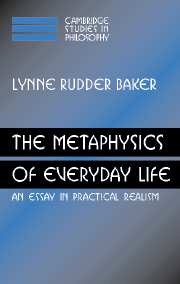4 - Human persons
Published online by Cambridge University Press: 22 September 2009
Summary
Human persons figure prominently in the everyday world. In this chapter, I shall add to the account of human persons given in Persons and Bodies, according to which persons are not identical to human organisms. After summarizing the Constitution View of persons, I shall consider the questions: When does a person come into existence? and When does a human organism come into existence? Then, after discussing some of the complexities of life and death, I shall show how this account of human persons satisfies a constraint that I call “quasi-naturalism.” Finally, I'll contrast the Constitution View of persons with its two main rivals: Animalism and Mind-Body Dualism.
THE CONSTITUTION VIEW OF HUMAN PERSONS
According to the Constitution View, human persons are constituted by human bodies without being identical to the bodies that constitute them. Let me begin with a clarification. Several philosophers suppose that I hold that “no actual human person is identical with any actual human being.” That is not my view. In ordinary language, the term “human being” is used ambiguously – both to name a psychological kind and to name a purely biological kind. So, I try to avoid the term. But when I use it, I am talking about human persons.
Person – like statue – is a primary kind, one of many irreducible ontological kinds.
- Type
- Chapter
- Information
- The Metaphysics of Everyday LifeAn Essay in Practical Realism, pp. 67 - 94Publisher: Cambridge University PressPrint publication year: 2007



